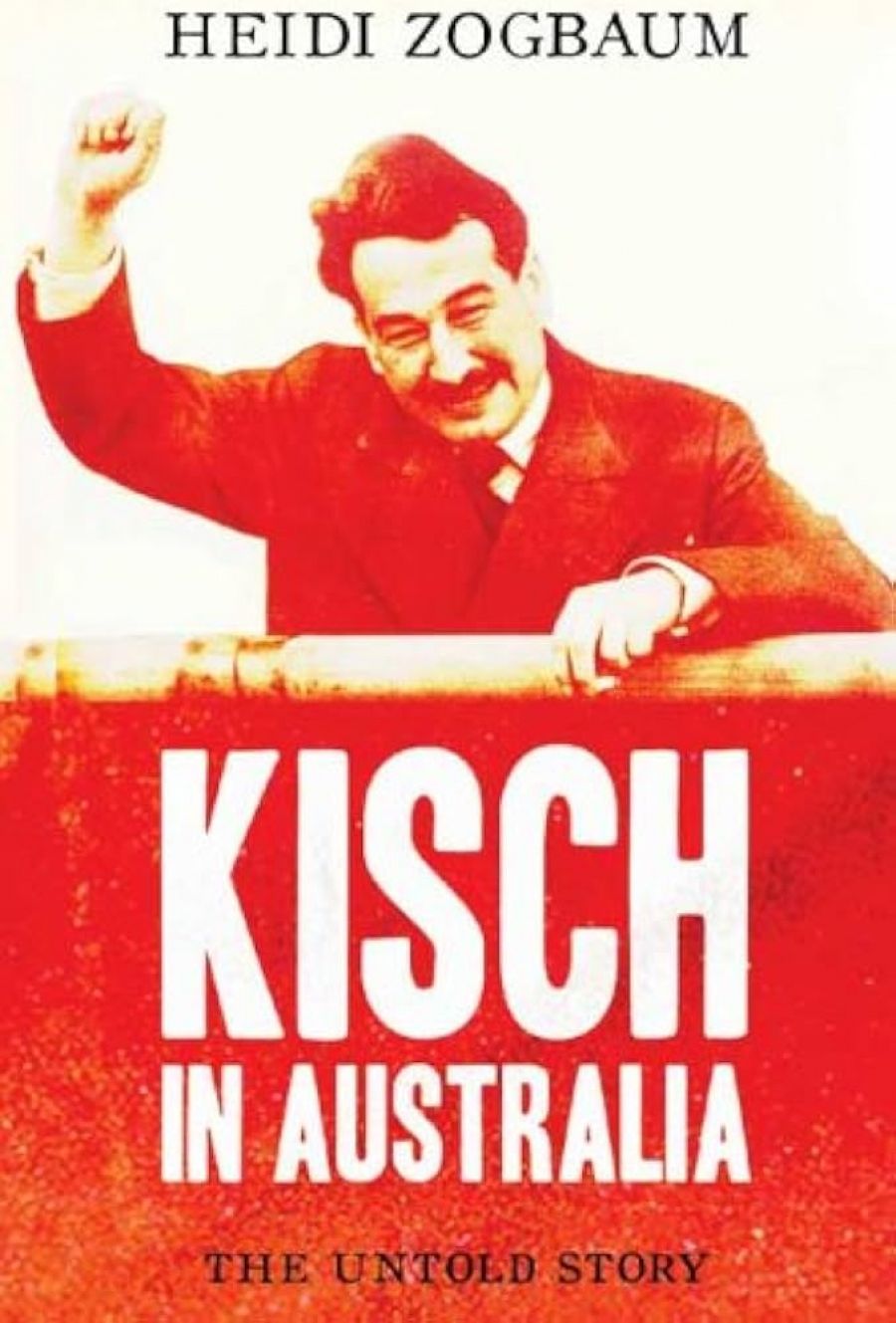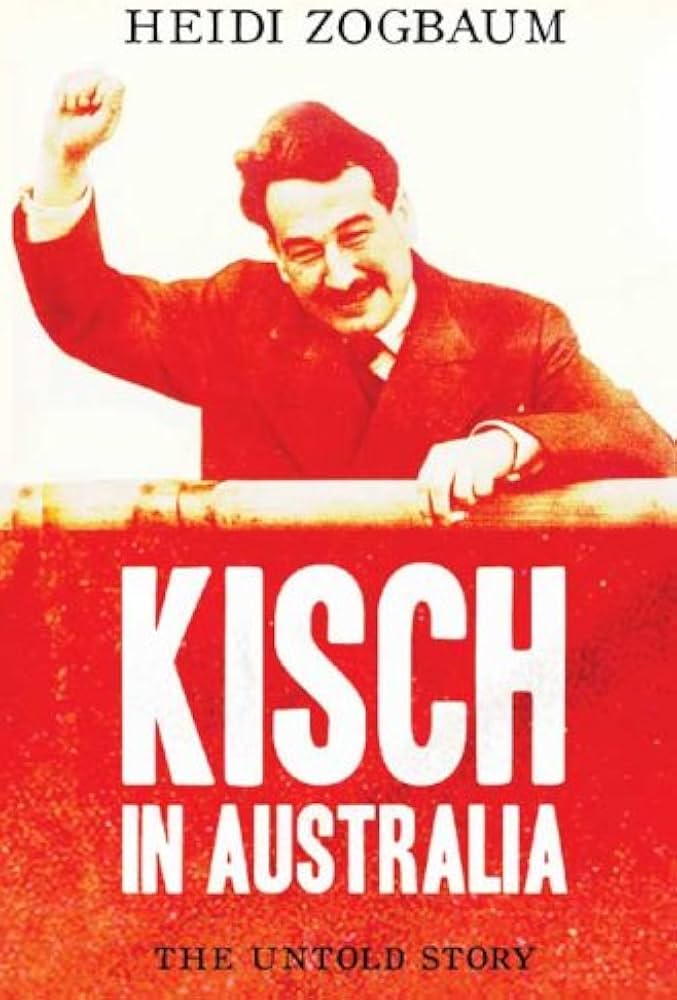
- Free Article: No
- Contents Category: Biography
- Review Article: Yes
- Article Title: The Jumper
- Online Only: No
- Custom Highlight Text:
An unfamiliar character from a strange land is barred from setting foot on mainland Australia. Desperate to land, he leaps from ship to shore, breaking his right leg in the process. A conservative attorney-general desperate to protect our borders, pursues this man, now on crutches, through the courts. The charismatic stranger wins his court case and holds the government up to ridicule. Shadowed unrelentingly by Canberra’s spooks, he urges Australians to look past their government’s pronouncements and discover for themselves the real dangers to world peace. Whilst history, even in Marx’s cycles of tragedy and farce, never neatly repeats itself, these duels between Egon Kisch, Czech communist, and Robert Menzies, Anglophile attorney-general, do have contemporary import. No doubt this explains why Kisch’s adventures in 1930s Australia have been told several times through film, theatre and books. In this new and enjoyable recasting of the drama, Heidi Zogbaum reminds us of the bare bones of Kisch’s Australian sojourn, focusing for the most part on his successful courtroom battles and European background. These are interspersed with detailed summaries from spies such as ‘Snuffbox’, charged with dredging up the evidence on Kisch’s European activities that led to his eventual deportation.
- Book 1 Title: Kisch in Australia
- Book 1 Subtitle: The untold story
- Book 1 Biblio: Scribe, $26.95pb, 240pp
- Book 1 Cover Small (400 x 600):

- Book 1 Cover (800 x 1200):

Egon Kisch, as Zogbaum nicely puts it, ‘jumped into Australian history on 13 November 1934’. With the Nazis terrorising Germany, the Melbourne branch of the Movement against War and Fascism invited Kisch for a speaking tour. Apparently more concerned about the infiltration of urbane communistic ideals than the brutalities of European fascism, Australia’s conservative leaders prevented Kisch from landing, hence his leap onto the Melbourne wharf. During his Australian cavalcade, Kisch signed autographs as ‘The Jumper’ and became for a short time that contradictory creature, a Marxist celebrity. No doubt his quick rise to the status of folk hero pricked the complacency of Menzies, who sought again to have Kisch returned to Europe. Menzies pursued Kisch by way of the Immigration Act. A fellow communist speaker had been successfully returned to New Zealand after he failed the infamous dictation test, in being unable to translate a passage from Dutch into English. Aware of Kisch’s mastery of continental languages, the immigration authorities tried him in Gaelic, which he refused to attempt to translate. As it turned out, the immigration officer supervising the test knew nothing of Gaelic either and would not have been able to check any answers that Kisch might have given. A Kisch defence group, headed by Labor MP and sharp lawyer Frank Brennan, immediately challenged the use of Gaelic. Brennan stood firmly within the Irish-Australian cultural tradition, but still insisted that Gaelic was a dead language, and thus irrelevant as a test. This outraged Australia’s few Scottish nationalists, among them Sir Mungo MacCallum, chancellor of the University of Sydney. A hasty amendment to the Immigration Act did see Kisch deported, and in 1935, accompanied by John Fisher, son of the former ALP prime minister, Andrew Fisher, he sailed for France.
There, Egon Kisch wrote his unique tribute to Australian trade unionism, working-class culture, political solidarity and the Aboriginal people: Australian Landfall (1937 German edition, 1969 Australian edition). Like many other literary figures on the left, he then set out to aid the republicans in the Spanish Civil War. After the fall of the Spanish republic, he then had to flee from the Nazi advance into France by way of the US. Kisch ended up in Mexico. No doubt saved from Stalin’s murders by these intercontinental flights, he returned to Czechoslovakia in 1946. Kisch died a few years later, before the Stalinists could crush what remained of the free-thinking left in Eastern Europe.
Zogbaum shrewdly and gently plays on the farcical aspects of the Kisch saga. At the same time, the book remains sensitive to that urbane and tolerant socialism of which Kisch was a unique representative. It is this connection, between the Australian Popular Front and a European, rather than a British or American, radicalism, that is the most intriguing aspect of this book and of Kisch’s Australian travels. Zogbaum includes an afterword by Kisch’s biographer Marcus Patka, as well as extracts from Australian Landfall. Kisch writes brilliantly about the marginalisation of Aborigines. He also presents us with a timely reminder that it was the Popular Front organisations of the 1930s that broke new ground in demonstrating solidarity with Aborigines.
Zogbaum remains aware of the resonances that the Kisch story retains for the twenty-first century, referring to him at one stage as one of Australia’s first boat people. But the analogy is treated warily and not pushed too far. The key qualities of the book lie in its clear picture of the bumbling parochialism of Australia’s conservative political ‘élite’ and Zogbaum’s (and Patka’s) reconstruction of the diverse and sophisticated socialism of middle Europe in the interwar years. The extracts from Australian Landfall allow us a richer and more sanguine depiction of Australian life, from the world of horse racing to the rights of black Australians, than we are likely to get from our current crop of revisionist historians. Kisch admired ordinary Australians and these Australians, defined too easily in current histories by their racism and insularity, made a Czech leftist who hobbled on crutches through their towns into a folk hero. Along with other stirrers and troublemakers, Kisch deserve his place in Australian folklore. This book, with its reminders of a now-vanished tradition of socialist tolerance, deserves to be read, especially by contemporary Australians wishing to locate themselves on the side of peace and jumpers overboard.


Comments powered by CComment